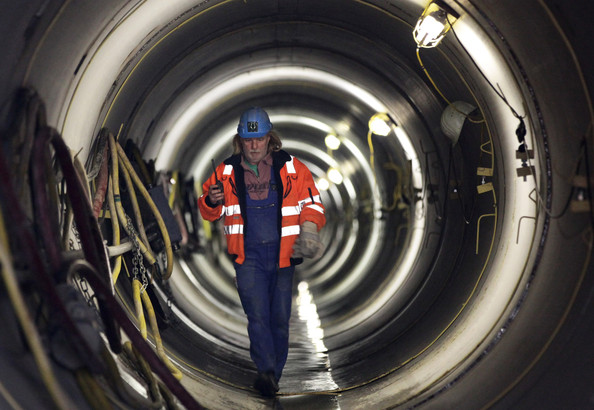
Gazprom Resists Application of EU Law on Opal Pipeline in Germany
Publication: Eurasia Daily Monitor Volume: 10 Issue: 134
By:

Russia’s Ministry of Energy and Gazprom want the European Commission to exempt the biggest pipelines in Germany, OPAL and NEL, from the European Union’s energy market legislation. OPAL and NEL are Gazprom’s joint ventures with Wintershall in Germany. The EU’s Third Legislative Package requires vertically integrated companies to separate (“unbundle”) gas supply from pipeline ownership or control. At a minimum it requires such gas suppliers to reserve 50 percent of their pipelines’ capacities for the use of competing suppliers (“third-party access”). This legislation aims to de-monopolize market access and foster price competition in the European Union.
Moscow, however, is resisting the application of EU law to these pipelines. It seems to feel optimistic that it can negotiate concessions out of the European Commission and German authorities, so as to legalize Gazprom’s vertically integrated arrangements (Kommersant, July 19).
OPAL and NEL are overland transmission pipelines dedicated to serving the Gazprom-controlled Nord Stream system. That system runs from Russia to Germany along the Baltic seabed, in two parallel lines with a combined capacity of 55 billion cubic meters (bcm) per year. Nord Stream lands on the German coast at Lubmin (near Greifswald), which is the point of inception of OPAL and NEL running inland. Their design capacities are 35 bcm and 20 bcm per year, respectively, in combination matching the Nord Stream system’s 55-bcm capacity.
OPAL (“Baltic Pipeline Connector”), the largest-capacity overland gas pipeline in Europe, runs 470 kilometers toward central Germany (with a short detour through the Czech Republic—see below). NEL (“North German/European Gas Pipeline”) runs 440 kilometers toward Hamburg and further toward the Netherlands border. OPAL and NEL carry Russian gas into major transmission pipelines in Germany’s interior, and potentially into several neighboring countries. OPAL was completed in 2012 while NEL was due for completion in 2013. Construction costs have been estimated at €1 billion ($1.3 billion) for each.
The joint venture of Gazprom and Wintershall, WinGas (recently renamed W&G), controls OPAL, NEL and related infrastructure. W&G (via a fully owned subsidiary) holds 80-percent ownership and the operating rights in OPAL, with E.ON Ruhrgas holding the remainder 20 percent of shares. W&G again (through a fully owned subsidiary) operates NEL and directly holds 51-percent ownership, with Nederlandse Gasunie and the Belgian Fluxys owning 25 percent and 24 percent, respectively (www.naturalgaseurope.com).
The same minority shareholders in OPAL and NEL are also vested in Nord Stream. There, Wintershall and E.ON Ruhrgas hold 15.5 percent each, and Gasunie 9.5 percent, under Gazprom’s overall control with 51-percent ownership. Gazprom has created a system of vested interests in EU territory, motivating such partner companies to resist the EU’s market legislation and protect the interests they share with Gazprom.
Gazprom tends to book the full capacity of pipelines under its control even if it does not intend to use them at full capacity. In some cases the under-utilization is planned in advance. Nord Stream, its first line commissioned in 2011 and its second line in 2012, is capable of operating at full capacity, and Gazprom has indeed fully booked it on the “ship-or-pay” principle in the knowledge that it would only use it at less than half-capacity, or even one-third capacity, this year and probably beyond (Interfax, July 8).
Booking Nord Stream’s full 55-bcm capacity justifies Gazprom correspondingly to claim OPAL’s and NEL’s capacities, amounting to the same 55 bcm. The Russian government and Gazprom therefore argue that they need not share pipeline capacity with third parties, and that no competitor is in sight anyway. Moscow further claims that OPAL and NEL are equivalent to trans-border pipelines, simply as continuations of the offshore Nord Stream. With this thesis, Moscow seeks to evade the application of EU law on the EU’s mainland territory in Germany.
At the recent EU-Russia summit in Yekaterinburg and during the St. Petersburg Economic Forum, the Russian side used these arguments to demand exemptions for these pipelines. Thus, “OPAL cannot have other users, because it is fed by Nord Stream, which comes from Russia.” Moreover, against the unbundling requirement, Moscow has demanded that there be no separation between gas owners and pipeline owners/operators (Interfax, June 4, 6, 21, 25, 28).
Representatives of Russia’s energy ministry, Gazprom, the European Commission and German authorities have held serial meetings in recent months on this issue. Moscow seeks to all but eliminate the 50-percent capacity reservation requirement for third-party users of OPAL (and then NEL). Moscow aims to achieve this result by agreement with the European Commission on a solid, precedent-setting legal basis.
Toward that end, Gazprom proposes to announce from time to time public auctions for third parties that might want to use portions of pipeline capacities. This would imply allowing a hypothetical supplier to sell gas at the point of entry into OPAL on the Baltic coast, for further transportation inland to a designated customer. Moscow proposes to inaugurate this practice with a gas shipment of 3 bcm through the OPAL pipeline via Germany, southward to the Czech Republic (Kommersant, July 9, 19).
OPAL connects with the Gazela pipeline from Saxony, at the Czech Republic’s northern border. OPAL then resumes its course from the Czech Republic’s western border with Bavaria into Germany.
The idea of supplying the Czech Republic and possibly Bavaria with Russian gas via Nord Stream and OPAL involves a gigantic detour. It would massively increase transportation costs, correspondingly reducing Gazprom’s netback revenue (if the added transportation cost is reflected in the sale price of its gas). Alternatively, it would force Gazprom to subsidize the transportation cost, for the sale price of those gas volumes to remain competitive.
In normal circumstances, the Czech Republic and partly Bavaria receive Russian gas supplies via the Ukraine-Slovakia-Austria transit corridor. At this time, however, Gazprom apparently wants to orchestrate threats of bypassing Ukraine’s transit system (with its continuation, the Slovakian transit system, a collateral casualty of Gazprom’s threats). Apparently, Gazprom is willing and able to pay the costs of such orchestration.




